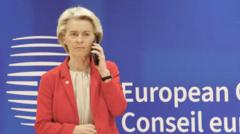The EU's General Court has ruled that the European Commission improperly denied access to text messages sent by Ursula von der Leyen during crucial negotiations with Pfizer for Covid-19 vaccines. Anti-corruption advocates praise the ruling, underscoring a need for greater transparency. The case, known as "Pfizergate," raises serious questions about record-keeping practices and accountability within the EU.
European Court Demands Transparency as von der Leyen's Text Messages Face Scrutiny

European Court Demands Transparency as von der Leyen's Text Messages Face Scrutiny
The European Court challenges the Commission's refusal to release text messages between von der Leyen and Pfizer's CEO amid vaccine negotiations.
In essence, this ruling highlights a significant shift towards transparency in EU governance.
The European Commission has been instructed to release text messages exchanged between Ursula von der Leyen, the president of the European Commission, and Albert Bourla, the CEO of Pfizer, during vaccine negotiations. The EU's General Court upheld a challenge from investigative journalists who sought access to these messages, indicating that the Commission’s refusal lacked a plausible justification.
The transactions, which included billions of euros in vaccine contracts and a notable agreement for 1.8 billion additional doses, have been shrouded in secrecy, raising concerns about accountability in decision-making during the pandemic. Transparency International has lauded the court's decision as a pivotal win for the public's right to information, calling for an end to the restrictive stance toward such requests by the EU.
The context for this legal battle traces back to 2021 when journalist Matina Stevis of the New York Times first reported on the private negotiations between von der Leyen and Bourla after BioNTech received regulatory clearance for its Covid vaccine. In a bid to shed light on the negotiation process, investigative journalist Alexander Fanta employed a Freedom of Information request. However, the Commission rebuffed his efforts, claiming the messages were not part of their official record-keeping.
Highlighting a legal gray area, the Commission argued that SMS messages did not necessarily qualify as accessible public documents. Yet, the European Ombudsman found the Commission’s failure to conduct a comprehensive search for those messages amounted to maladministration, fueling a further legal pursuit by Stevis and her publication.
In its ruling, the court emphasized that the Commission's reliance on vague assumptions and shifting explanations was inadequate. The burden of proof now lies with the Commission to demonstrate the existence—or absence—of the contested messages, including whether they have been deleted or inadvertently lost due to a change of devices.
As the ruling unfolds, the ramifications could ripple through EU governance, potentially reshaping the landscape of public access to information and underscoring the importance of transparency during critical moments in history.
The European Commission has been instructed to release text messages exchanged between Ursula von der Leyen, the president of the European Commission, and Albert Bourla, the CEO of Pfizer, during vaccine negotiations. The EU's General Court upheld a challenge from investigative journalists who sought access to these messages, indicating that the Commission’s refusal lacked a plausible justification.
The transactions, which included billions of euros in vaccine contracts and a notable agreement for 1.8 billion additional doses, have been shrouded in secrecy, raising concerns about accountability in decision-making during the pandemic. Transparency International has lauded the court's decision as a pivotal win for the public's right to information, calling for an end to the restrictive stance toward such requests by the EU.
The context for this legal battle traces back to 2021 when journalist Matina Stevis of the New York Times first reported on the private negotiations between von der Leyen and Bourla after BioNTech received regulatory clearance for its Covid vaccine. In a bid to shed light on the negotiation process, investigative journalist Alexander Fanta employed a Freedom of Information request. However, the Commission rebuffed his efforts, claiming the messages were not part of their official record-keeping.
Highlighting a legal gray area, the Commission argued that SMS messages did not necessarily qualify as accessible public documents. Yet, the European Ombudsman found the Commission’s failure to conduct a comprehensive search for those messages amounted to maladministration, fueling a further legal pursuit by Stevis and her publication.
In its ruling, the court emphasized that the Commission's reliance on vague assumptions and shifting explanations was inadequate. The burden of proof now lies with the Commission to demonstrate the existence—or absence—of the contested messages, including whether they have been deleted or inadvertently lost due to a change of devices.
As the ruling unfolds, the ramifications could ripple through EU governance, potentially reshaping the landscape of public access to information and underscoring the importance of transparency during critical moments in history.





















